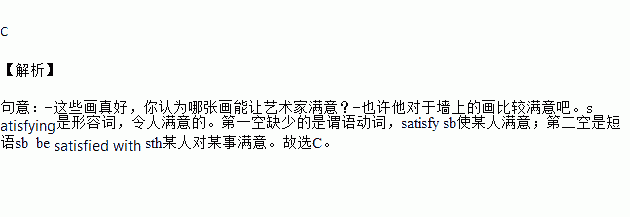题目内容
—How wonderful these paintings are! Which one do you think the artist?
—Perhaps he __________ the one hanging on the wall.
A. satisfying; satisfies B. satisfies with ; satisfies
C. satisfies ; is satisfied with D. satisfied with; is satisfied with
Good news! During the National Day holiday, there are some promotions(优惠)in Wanda Cinema. This film festival lasts ten days (Sunday, September 30th, 2018---Tuesday, October 9th, 2018). Here is the poster.
Film | Hello, Mrs Money
| Project Gutenberg
| River of Sorrow
| Shadow
|
Price | ¥70 | ¥80 (50% off for students ) | ¥50 | ¥70 |
Date | Sep. 30th Oct. 1st Oct. 3rd | Oct. 1st Oct. 3rd Oct. 5th | Sep. 30th Oct. 1st Oct. 4th | Oct. 2nd Oct. 4th Oct. 5th |
Time | 9:00 a.m. 4: 30 p.m. 8: 20 p.m. | 10:00 a.m. 7:10 p.m. 9:30 p.m. | 9:20 a.m. 3: 10 p.m. 5: 30 p.m. | 7:50 a.m. 9:50 a.m. 11:50 a.m. |
Tips | 50% off on Thursday for all. Free for children under 6 years old, half for people over 60 years old. A free large box of popcorn for students with student ID during the film festival. For more details, please call us on 5556 8806. Please arrive early. Latecomers will not be allowed to enter until a proper break in the shows. |
1.When can you watch films with 50% off ?
A. Sep.30th B. Oct.3rd C. Oct. 5th D. Oct.4th
2.Which movie can you watch on the afternoon of Oct. 4th?
A. Hello, Mrs Money B. River of Sorrow C. Project Gutenberg D. Shadow
3.What will happen to a latecomer?
A. He or she can only enter during a break. B. He or she will fail to enter the theatre.
C. He or she can still watch the whole show. D. He or she won’t have a proper break.
4.If Mrs Wang wants to watch Shadow with her 70-year-old father and her five-year-old son, she needs to pay ____________.
A. ¥210 B. ¥70 C. ¥105 D. ¥140
5.Which of the following is TRUE about the poster?
A. All the people can be offered a free large box of popcorn.
B. All the people will pay for the tickets during the film festival.
C. People without student ID can also enjoy the special price on Thursday.
D. You will not be allowed to enter the cinema without student ID.





